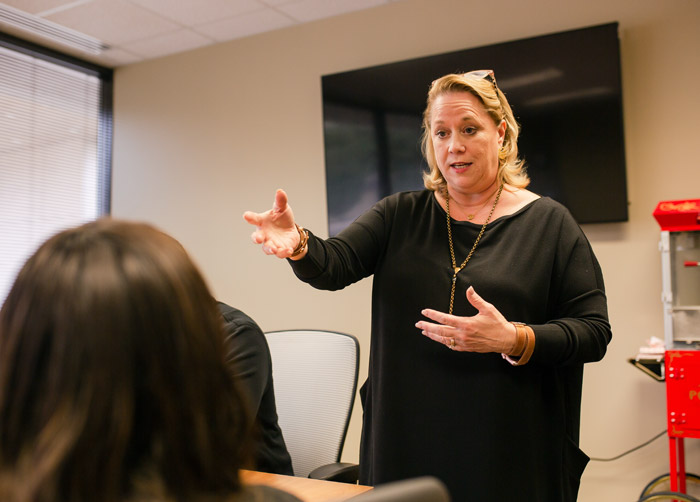
Kate Berinhout (right), a child learning and development senior at UT Dallas, took the #GOALS class in the fall and now serves as a teaching assistant for the course. As part of an expanded, community-based service learning program, the class is designed for UT Dallas students to help immigrant students in the Richardson Independent School District. Psychology senior Ayae Kato (left) is participating in the course.
In one of the newest University of Texas at Dallas classes, students are helping immigrant high schoolers with English. Another class is talking to fifth- and sixth-grade girls about social media and bullying. And still another is working with homeless teens in Dallas.
These classes are part of the University’s growing community-based service learning program, which gives students the opportunity to explore new topics while serving as teachers and mentors in the community.
The University received a three-year, $1 million grant The University of Texas System provided in 2017 for “Engagement through Collaboration, Mentorship, and Service Learning.” The service learning funds were part of a broader $10 million initiative that provided for campus-based programs in support of former Chancellor William H. McRaven’s Student Success Quantum Leap.
“Our students are learning as much from the high school students as the high school students are learning from them. They’re building relationships that come out of seeing these kids every week.”
Dr. Joanna Gentsch, senior lecturer in the School of Behavioral and Brain Sciences
The goal of community-based service learning is to increase students’ sense of belonging, one of three pillars that the UT System has identified as critical for student success. (The other pillars are finances and advising.) Belonging also is a priority of the new UT Dallas program Orbit: Keeping New Comets on Course.
The weekly, small-group classes have been a success, with many students saying the experiences were meaningful and gave them a greater sense of purpose, said Dr. Joanna Gentsch, director of student and community engagement in the Office of Undergraduate Education, who designed and expanded the program across campus.
“Our students are gaining a sense of belonging by connecting with each other and people in the community,” said Gentsch, a senior lecturer in the School of Behavioral and Brain Sciences who earned her master’s and doctoral degrees at UT Dallas. “The students become so close.”
The program has expanded from one class initially to 10 this spring. Separate courses focus on a range of topics and may not be offered each semester.
One of the most popular is #GOALS, in which UT Dallas students help immigrant students in the Richardson Independent School District (RISD).
Ashlea Campbell, program specialist for Student Assistance in RISD, said the classes have helped students from other countries better adjust to their new schools. As a result, the district expanded the program, now at four campuses, and asked UT Dallas to create a class to address bullying for upper-elementary girls. The class, called Richardson GIRLS (Going Into Real Life Successfully), reduced incidents and will be expanded to two more schools this spring.

Dr. Joanna Gentsch helps students prepare to work with immigrant students at a Richardson ISD school during a recent session of the #GOALS class. Gentsch, senior lecturer in the School of Behavioral and Brain Sciences, designed and expanded the service learning program.
“Our students are learning not just what the UT Dallas students are teaching them in lessons every week; their behavior is really impactful,” Campbell said. “Our students are learning social and emotional skills, whether they know it or not.”
In addition to the classes in the Richardson schools, the University offers a variety of community-based service learning courses, including Hidden in Plain Sight, which involves working with teens at a Dallas Independent School District drop-in center for homeless students. The sociology course is offered through the School of Economic, Political and Policy Sciences.
Another course, Juega Conmigo (Play With Me), facilitated by the UT Dallas Center for Children and Families, offers free weekly parent-child playtimes for children through age 3 at two community sites.
Other courses address topics such as Women in STEAM (Science, Technology, Engineering, Art and Math), LGBT issues, and pregnancy and parenting challenges.
The UT Dallas students benefit as much as the high school students, Gentsch said.
“Our students are learning as much from the high school students as the high school students are learning from them,” she said of the classes offered at three Richardson campuses last fall. “They’re building relationships that come out of seeing these kids every week.”
Edisa Saracevic, a psychology senior who took #GOALS last semester, said it was a rewarding experience that became the highlight of her week.
“I’ve grown to respect these students’ willingness to work hard,” Saracevic said. “They put so much effort into even the most minuscule of tasks. Seeing them put this much effort into everything makes me realize how much they want to succeed and was rather inspiring.”